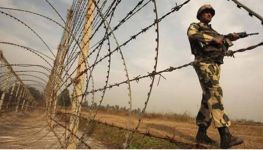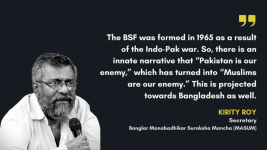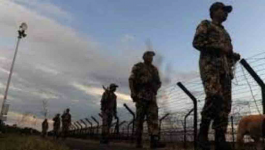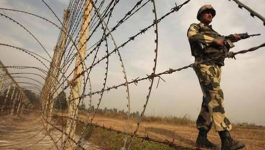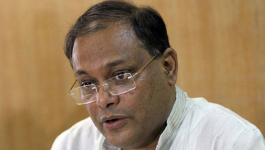India's border violence
Kallol Mustafa | Published: 00:00, Apr 02,2024 | Updated: 22:44, Apr 01,2024
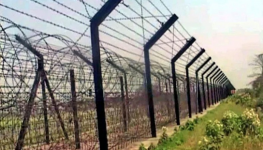
An image of a portion of Bangladesh-India border. —Web
INCIDENTS of shootings or killings on the border of two hostile neighbouring countries are not rare. But the case of one country regularly shooting and killing citizens of the other country on the border of two countries claiming officially to be 'friends' cannot be found anywhere else in the world except the Bangladesh-India border. Even on the Independence Day that India boasts of having helped Bangladesh achieve, two Bangladeshi citizens were shot dead by the Indian Border Security Force.
The BSF shot three Bangladeshi nationals dead in five days at the end of March alone. Earlier in January, two persons were shot dead by the BSF, including one Border Guard Bangladesh member. Killing along the Bangladesh-India border has been rising gradually over the last three years, despite repeated state-level commitments to bring such killings down to zero. According to human rights organisation Ain O Salish Kendra, 31 Bangladeshis were killed by BSF along the border in 2023, of whom 28 were shot dead. The numbers of Bangladeshi citizens killed by BSF in 2021 and 2022 were 18 and 23, respectively. According to the Ain O Salish Kendra, at least 522 Bangladeshis were killed by the BSF between 2009 and 2020.
When the issue of border killings came up, the BSF usually gave the excuse of firing in 'self-defense' under 'compulsion'. For example, in July 2022, the then director general of India's Border Security Force, Pankaj Kumar Singh, tried to justify the killing of Bangladeshi nationals, terming them as 'criminals'. He claimed that all those killed were involved in various crimes, including drug trade and cattle smuggling, as if the BSF could stamp any foreign citizen as a criminal without any trial and then kill the alleged criminal at will!
First, cattle smuggling, like all other commodity smuggling, is a joint venture involving both Indian and Bangladeshi sellers and buyers. The rules of a market economy dictate that any commercial transaction, whether legal or illegal, can only take place if both parties benefit. In this regard, Kirity Roy, secretary of Banglar Manabadhikar Suraksha Mancha, a rights organisation based in West Bengal, has rightly said, 'The story that is told to justify border killing is also not true. They say cattle are smuggled across the border, and those smugglers are killed. It seems as if cows are born at the border and smuggled into Bangladesh. In fact, these cows are brought from Haryana and Punjab, crossing 2,000 to 2,500 kilometres of distance in India. The cattle are brought on foot, by truck, or by train. Is it believable that no one sees these? Nobody stops these because everyone gets their share. The real issue here is corruption; the BSF kills when there is a dispute with the distribution of the spoils.'
Secondly, neither the Indian Penal Code nor any international law allows shooting or killing a smuggler at will. Anyone crossing the border illegally can be arrested and prosecuted. India ignores all internationally accepted border control protocols and bilateral border management instruments like the Joint India-Bangladesh Guidelines for Border Authorities of the Two Countries, 1975, and the India-Bangladesh Coordinated Border Management Plan, 2011. For example, to avoid the possibility of 'unpleasant incidents', according to Article 8(i) of the Joint India-Bangladesh Guidelines for Border Authorities of the Two Countries, 1975, if nationals of one country ingress the working boundary and enter illegally and commit or attempt to commit an offence, the border security forces would be at liberty to take appropriate action in the exercise of the 'right to private defence' preferably without resorting to fire (emphasis added). And according to Article 8(m), whenever any cattle are alleged to have been lifted across the border, a report will be lodged with the opposite post commander (emphasis added), to whom the details, such as the tracks of the cattle and the criminals involved, etc, will be handed over. The border post commander concerned will acknowledge receipt of the report and then inform the nearest police station in his own country, who will make all efforts to recover the cattle and apprehend the criminals.
But does the BSF follow this simple procedure to prevent smuggling while avoiding 'unpleasant incidents'? Evidence suggests otherwise. According to an investigation report by Human Rights Watch titled 'Trigger Happy': Excessive Use of Force by Indian Troops at the Bangladesh Border', all the victims of BSF killings were either unarmed or armed with only sickles, sticks, and knives, which suggests that in shooting victims, the BSF are likely to have used excessive force. In a number of cases, the victims were shot in the back, suggesting that they were running away. In others, injuries indicate the person was shot at close range, with witnesses often alleging that the person was tortured and killed in BSF custody. In none of the cases investigated by Human Rights Watch did the BSF show that it had recovered lethal weapons or explosives that could pose an imminent threat of death or serious injury that might justify killings in self-defence.
Thirdly, incidents like the Felani killings make it clear that the BSF's pretext of self-defence is bogus. How could an unarmed teenage girl like Felani Khatun, whose clothes were stuck in barbed wire, pose a threat to the heavily armed BSF? After the killing of Felani by the Indian BSF in the early hours of January 7, 2011, her body was hanging on the barbed wire fence for a long time. The image of the hanging body of the teenage girl on the barbed wire sparked outrage and protests at home and abroad.
But even after such an incident, the BSF member who killed Felani was not punished; rather, the BSF court acquitted him. Then the case was brought to the Supreme Court of India, but it has not been heard yet. Felani's mother, Jahanara Begum, who was angry and disappointed at not getting justice, said that no one should lose her child; not even a bird should die at the hands of the BSF on the border. Felani's mother wanted not a single bird to die in the hands of BSF, but alas, BSF is continuing to kill people like birds on the Bangladesh-India border!
It is clear from all these incidents that no matter how friendly it claims to be, India's behaviour in border management is that of an aggressive and dominating eighbor. It is noteworthy that the Indian BSF, which behaves as 'trigger happy' on the border of its 'friendly' neighbour Bangladesh, does not behave the same way on the borders with hostile neighbours like China or Pakistan. There may be a state of war and isolated shootings and killings on those borders, but there are no such one-sided border killings like on the Bangladesh-India border.
Although the Indian BSF has been carrying out serial killings on the border of Bangladesh, rarely is there any strong protest from the Bangladesh government. On the one hand, Bangladesh is unilaterally giving various favours and facilities to India, including transit, connectivity, ports and the business of power and energy. On the other hand, India is depriving Bangladesh of its fair share of trans-boundary river water while killing Bangladeshi citizens one after another on the border.
In this kind of scenario, the government of Bangladesh could take a strict and clear stand against the killings of the BSF on the border and demand a trial and investigation of every such incident, leveraging India's strategic dependence on Bangladesh for transit and connectivity. But no such attempt has been made by the Bangladesh government to turn the issue of border killings into a bilateral and international issue, which clearly indicates Bangladesh's weak foreign policy towards India.
In order to stop the border killings, it is necessary for the Bangladesh government to put effective pressure on India in bilateral and multilateral forums and be vocal about investigating and prosecuting every incident of border killings.
Kallol Mustafa is an engineer and writer who focuses on power, energy, environment and development economics.











